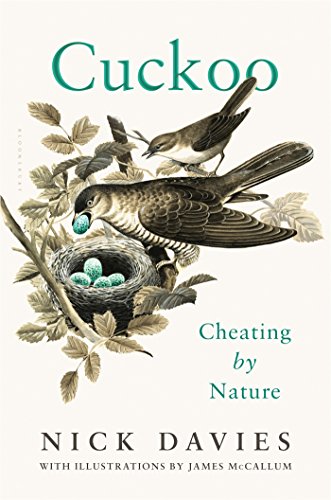
Cuckoo
Cheating by Nature
کتاب های مرتبط
- اطلاعات
- نقد و بررسی
- دیدگاه کاربران
نقد و بررسی

February 9, 2015
British field ornithologist Davies (Cuckoos, Cowbirds, and other Cheats) dials into the parasitic behavior of Britain’s favorite harbinger of spring, the cuckoo, as he details the “evolutionary arms race” between cuckoos and their hosts, which yields adaptations and behavior that seem exquisitely well-tuned, but sometimes incomprehensibly sloppy. He walks readers through Wicken Fen, his fieldwork site for more than 30 years, carefully observing the clever manipulations of cuckoos and their targets: reed warblers, wagtails, meadow pipits, and dunnocks. With meticulously designed experiments, Davies discovered the intricacies of egg mimicry, part of an “egg arms race between cuckoos and hosts.” He explains some of the more complex host behaviors within a Darwinian framework, addressing the cost-benefit assessments that host parents must make to determine if they should remove a dubious egg, attack a potentially predatory nest invader that could just be a cuckoo mimic, or feed a hyperstimulated cuckoo chick that is mimicking the sounds of the host brood. Davies’s bird story is satisfying not only for his strong conclusions and well-maintained focus, but because it also highlights the value of scientific observation. B&w illus., color insert.

Starred review from December 1, 2014
Davies (behavioral ecology, Cambridge Univ.; Cuckoos, Cowbirds and Other Cheats) presents a labor of love three decades in the making. His subject: the common cuckoo (Cuculus canorus), a bird of large cultural importance and fascinating habits. His laboratory: Wicken Fen, one of Britain's oldest nature preserves. The author fancies his book as a kind of nature detective story, one in which the mystery to be unraveled involves avian brood parasitism. Cuckoos lay their eggs in others' nests, freeing themselves from the rigors of raising chicks. What transpires is a dramatic coevolutionary "arms-race," wherein the host birds (in this case usually reed warblers) evolve various defenses against the trickery and the parasites evolve ever more ingenious (and ruthless) means of exploitation. Davies recounts many field experiments seeking not just the "how" but also the "why" behind cuckoo (and host) behavior. He tips his hat often to amateur investigators and researchers both past and present. As so many contemporary accounts of avian life do, the book ends with an alarming note about declining cuckoo populations. VERDICT This is highly literate, beautifully written natural history--where the big ideas presented (e.g., evolution, natural selection) will engage amateur and expert readers alike.--Robert Eagan, Windsor P.L., Ont.
Copyright 2014 Library Journal, LLC Used with permission.

March 1, 2015
Are cuckoos the avian model of bad parents? Many cuckoo species lay their eggs in the nests of other birds and fly away. Hatched cuckoo chicks then usually push the host's eggs and chicks out of the nest. Might cuckoos actually be very successful parents, having carefully chosen foster parents who raise more cuckoo chicks than they could if they kept their own nests? Do the foster parents have any defenses against this deception? Behavioral ecologist Davies of the University of Cambridge has spent more than three decades in the fens near his college trying to answer these and other questions about cuckoos and the birds they victimize. He describes experiments involving recorded bird calls, radio transmitters, and egg substitutions, and he reports findings that suggest how predators and prey continue to adapt. Readers may gain some respect, if not affection, for a hard-to-understand bird.(Reprinted with permission of Booklist, copyright 2015, American Library Association.)

























دیدگاه کاربران